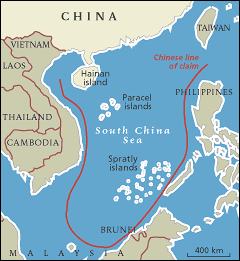PoliticalChic
Diamond Member
- Thread starter
- #241
So they want oil and gas. Why is that something we should be afraid of. PLEASE do not post another of your long tl:dr articles. Just tell me in simple English in a paragraph or two, please. If you can.Most of the shipping in the South China Sea is from China, a huge trader in the world. Since we are the largest trading partner with China, I guess we would find it necessary to transit the South China Seas, but wouldn't China need that, too? It takes two to trade.I guess I'd find a more practical answer helpful.I care----the South China sea is part of the pacific in the same manner that the EAST RIVER is part of the Hudson
Excellent question.
"How much trade transits the South China Sea? The United Nations Conference on Trade and Development (UNCTAD) estimates that roughly 80 percent of global trade by volume and 70 percent by value is transported by sea."
How much trade transits the South China Sea? | ChinaPower Project
How much trade transits the South China Sea? | ChinaPower Project
There was no need for you to post that insult. I was simply asking a question.
If we take suggestions from those as short-sighted as you are, we would allow China to control some 80% of all commercial shipping, as well as the gas and oil reservoirs of that area.
"The Geopolitics of Oil and Gas in the South China Sea
Insights from Eufracia Taylor and Hugo Brennan.

By Mercy A. Kuo
December 12, 2018
Diplomat author Mercy Kuo regularly engages subject-matter experts, policy practitioners and strategic thinkers across the globe for their diverse insights into U.S. Asia policy. This conversation with Eufracia Taylor and Hugo Brennan – Senior Asia Analysts at risk consultancy Verisk Maplecroft – explores the motives of China’s push for joint oil and gas exploration in the South China Sea, and the broader consequences for geopolitics.
Explain the agenda behind Beijing’s offer of “joint oil and gas exploration” in the South China Sea to Southeast Asian countries.
The assertion of sovereignty over disputed areas is the name of the game, and Beijing considers joint oil and gas exploration as an important policy tool in pursuit of this goal. Signs of claimant states negotiating with Beijing to jointly explore for resources in their own Exclusive Economic Zones (EEZs) go a long way towards legitimizing China’s nine-dash line.
The strategic context affecting upstream development in the South China Sea is a rising China that is increasingly able and willing to assertively pursue its perceived sovereign rights to oil and gas resources."
The Geopolitics of Oil and Gas in the South China Sea
A pity you stuck to Chutes and Ladders rather than Chess.
1. I post the way I choose. Your ADD is not a consideration to me. There are medications you can avail yourself of.....speak to your doctor to see if they're right for you.
2. "So they want oil and gas.:
IT'S-NOT-THEIRS.
To understand where China will look to solve it's energy problem,...

Paracel and Spratly Islands Forum The Cow Tongue China s Claims in the Eastern Sea South China Sea
6. "...it is not difficult to understand...of seizing the South China Sea, ...when briefing papers are telling them of untold riches of the sea. According to estimates...Nansha's ( the eighth largest island of Spratly Islands and the fourth largest among Philippine-occupied Spratly islands) oil reserves total over 10 billion tons..."
From the novel "Dragon Strike," by Hawksley
a. " In 1968, oil was discovered in the region.[4]The Geology and Mineral Resources Ministry of the People's Republic of China (PRC) has estimated that the Spratly area holds oil and natural gas reserves of 17.7 billion tons (1.60 × 1010kg),[citation needed]compared to the 13 billion tons (1.17 × 1010kg) held byKuwait, placing it as, potentially, the fourth largest reserve bed in the world. These large potential reserves have assisted in intensifying the territorial claims of the neighbouring countries." Spratly Islands dispute - Wikipedia the free encyclopedia
7. " The Spratly Islands dispute is an ongoing territorial dispute between Brunei,China (People's Republic of China),Malaysia, the Philippines,Taiwan (Republic of China), and Vietnam, concerning ownership of the Spratly Islands, a group of islands and associated "maritime features"(reefs, banks, cays, etc.) located in the South China Sea. The dispute is characterised by diplomatic stalemate and the employment of low-level military pressure techniques (such as military occupation of disputed territory) in the advancement of national territorial claims. All except Brunei occupy some of the maritime features." Spratly Islands dispute - Wikipedia the free encyclopedia
If it were to gain total control of the South China Sea, which includes the Spratly and Paracel Islands, China would not need to import a drop of oil for the foreseeable future.
As an emerging superpower......what do you suppose the future of the South China Sea indicates?
Trying to educate you is like trying to crack ice with a banana.
Wise up, you dunce.
:quality(75)/curiosity-data.s3.amazonaws.com/images/content/thumbnail/standard/0cea5417-e0f8-405c-f3f1-08216346cbe7.png)